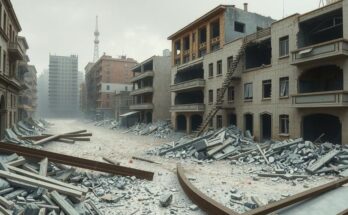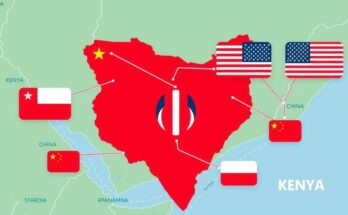Iran and the United States have made progress in indirect nuclear talks, with a third round scheduled for April 26 after a constructive second round. Iran’s officials remain cautiously optimistic but emphasize the ongoing complexities of the negotiations. The focus remains on Iran’s nuclear intentions and maintaining a diplomatic relationship, despite longstanding tensions.
Following a second round of indirect nuclear negotiations, Iran’s foreign ministry announced that progress has been made in talks with the United States. These discussions, which Iran’s Foreign Minister Abbas Araghchi deemed “constructive,” are set to continue next week, with another meeting slated for April 26. The talks were described as moving forward, albeit there remains a cautious outlook from both sides.
The two delegations, led by Araghchi and U.S. Special Envoy Steve Witkoff, engaged in four hours of discussions within the Italian Embassy in Rome. While separated during the talks—communicating via Omani Foreign Minister Badr al-Busaidi—the diplomats reportedly achieved a better understanding on key principles. Still, no official commentary has been released by the U.S. regarding these meetings, indicating a level of secrecy in the ongoing negotiations.
Expectations for the next round are mixed, as Araghchi mentioned the aim to arrive at a more favorable position following further technical meetings. He also expressed a tempered viewpoint, saying there is “no reason for excessive optimism or pessimism,” reflecting a hesitant but hopeful approach towards future discussions.
The context of these negotiations is part of a larger picture where Iran seeks assurance amidst longstanding concerns about its nuclear ambitions, which it insists are entirely peaceful. Recent comments from Rafael Grossi, head of the International Atomic Energy Agency, reinforce these anxieties, pointing out that Iran is “not far” from potentially acquiring nuclear weapons capabilities.
The geopolitical backdrop adds complexity, with the U.S. having no formal diplomatic relations with Iran since the Islamic Revolution in 1979. Former President Donald Trump’s renewed sanctions and shifted diplomatic tactics have raised questions about U.S. intentions. At the moment, the persistent tension lies around whether Iran can maintain elements of its nuclear program, which some U.S. hardliners adamantly oppose. Essentially, the negotiations have yet to delve deeply into crucial specifics concerning nuclear details, potentially leaving the most critical discussions for future rounds.
In summary, Iran and the United States are progressing through a series of indirect negotiations about Iran’s nuclear program, with optimism tempered by caution on both sides. The foreign ministry’s announcement indicates that further discussions will take place next week. Both nations hope to clarify their positions regarding Iran’s nuclear intentions and the future of their diplomatic relationship amidst complex geopolitical issues.
Original Source: www.aljazeera.com




